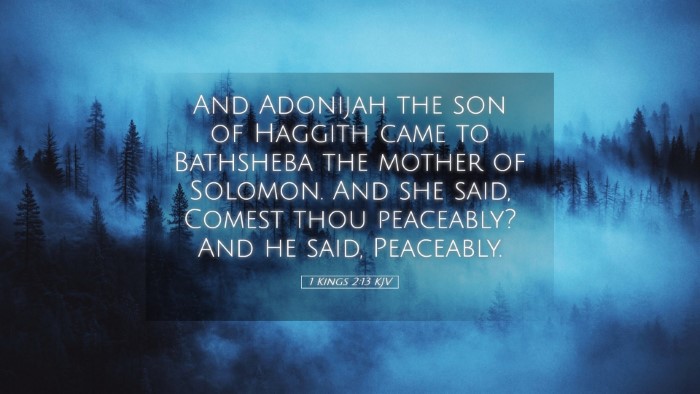Commentary on 1 Kings 2:13
Verse: "And Adonijah the son of Haggith came to Bathsheba the mother of Solomon. And she said, Come thou peaceably? And he said, Peaceably."
Introduction
This verse occurs during a critical transition of power in the kingdom of Israel, signifying both a political and spiritual shift. The events surrounding Adonijah and Bathsheba reveal themes of ambition, betrayal, and the complex dynamics within David’s family.
Contextual Background
Adonijah, the son of Haggith, had previously attempted to usurp the throne of Israel, positioning himself as king while his brother Solomon was designated by David to succeed him. Bathsheba, the mother of Solomon, holds a pivotal role at this juncture, representing not only maternal concern but also the political maneuverings necessary in the royal court.
Historical Context
The narrative unfolds during the final days of King David's reign, where tensions between his sons surface violently. Adonijah’s actions have sowed discord that is reflective of the challenges Israel faces in sustaining unity amidst internal strife.
Commentary Insights
Matthew Henry's Commentary
Henry emphasizes the significance of Bathsheba's inquiry into Adonijah’s intentions. Her question, “Come thou peaceably?” highlights the suspicion that surrounded Adonijah following his earlier attempts at claiming the throne. Each interaction in this power play is tinged with caution considering Adonijah's checkered past.
Albert Barnes' Notes
Barnes draws attention to the implications of peace in this encounter. Adonijah’s assurance of peace could be seen as a façade to cloak his ulterior motives. This engagement sets the stage for the events that follow, including Adonijah's subsequent request for a marriage alliance with Solomon's harlot. Barnes stresses that such union underscores the depth of his ambition and calculated risk.
Adam Clarke’s Commentary
Clarke elucidates the emotional weight of Bathsheba’s character during this confrontation. Her role is that of a mediator, a protector of her son's interests amidst the political turmoil. Her cautious nature embodies both the wisdom and vulnerability inherent in a woman navigating a patriarchal landscape. Clarke also notes that her recognition of Adonijah signifies a complex mix of familial loyalty and political pragmatism.
Theological Implications
This verse underscores the overarching themes in Scripture of authority, legitimacy, and divine appointment. Bathsheba’s position, as the mother of the king, places her in a unique position of influence, yet she remains aware of God’s sovereignty in the rise and fall of leaders.
Human Ambition Vs. Divine Will
The encounter accentuates the struggle between human ambition—represented by Adonijah—and God’s established purpose, which lies with Solomon. The verse serves as a reminder to both leaders and followers in the church today about the principles of seeking God’s will in every endeavor.
Character of God
The divine providence is evident; God’s sovereignty orchestrates events behind the scenes. As the narrative progresses, it becomes increasingly clear that God’s purpose will prevail despite human schemes. The tension between divine authority and human autonomy plays out vividly in the political landscape of Israel.
Applications for Today
This passage holds various applications for contemporary readers, especially for pastors and theologians aiming to derive lessons on leadership, familial relationships, and spiritual integrity.
- Awareness of Motives: Just as Bathsheba questioned Adonijah's intent, leaders must remain vigilant regarding the motives of those around them.
- God's Sovereignty: Trusting in God's plan is paramount, especially when human ambitions clash with divine purpose.
- Political vs. Spiritual Leadership: The account reiterates the need for spiritual discernment to navigate political dynamics within the church and society.
- Family Dynamics: Like Bathsheba's protective role, leaders in familial contexts should prioritize the well-being of their children while maintaining righteousness.
Conclusion
In conclusion, 1 Kings 2:13 serves as a profound reminder of the complexities of leadership, the significance of intentions, and the overarching sovereignty of God in the affairs of humanity. By drawing insights from historical accounts and theological reflections, believers can navigate their personal and communal experiences with wisdom and discernment.


